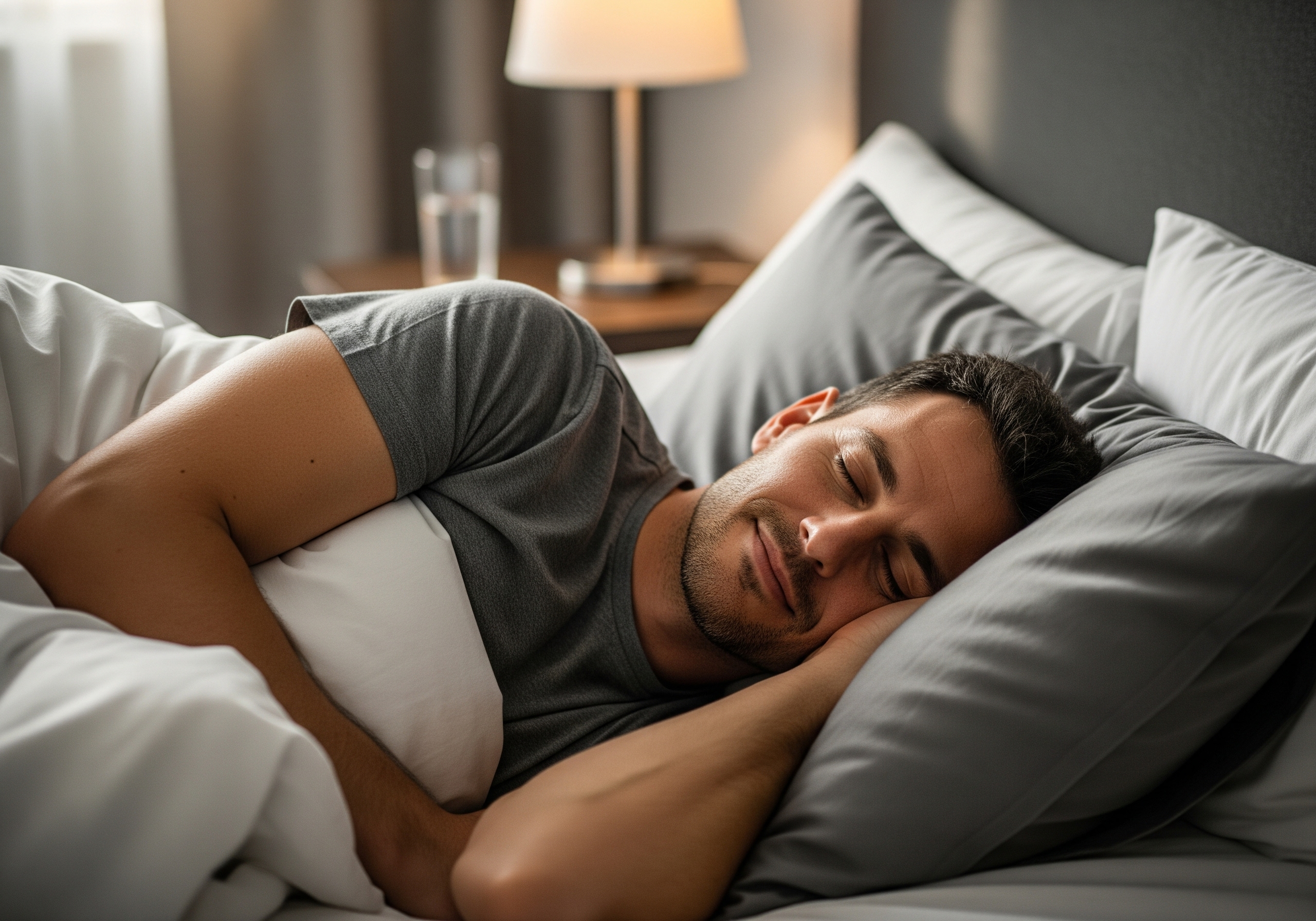The Foundation of Physical and Mental Vitality
In the pursuit of better health, most men focus on the usual suspects: nutrition, fitness, and productivity. Yet one of the most powerful — and most overlooked — factors behind peak performance is also the simplest: sleep.
Sleep is not a passive state. It’s an active and essential process where your body recovers, your brain processes information, and your hormones reset. Without enough quality sleep, no diet or workout plan will deliver the results you’re after. Poor sleep affects everything from testosterone levels and mental clarity to metabolism, heart health, and emotional stability.
Despite its importance, millions of men struggle to get consistent, restful sleep. Whether it’s late-night screen time, stress, irregular routines, or simply not making rest a priority, the result is the same: fatigue, irritability, reduced focus, and long-term health risks.
The good news is that restorative sleep isn’t out of reach — and you don’t need expensive gadgets or medications to get there. With intentional changes to your evening habits, sleep environment, and daily rhythm, you can transform your nights and wake up truly recharged.
Why Sleep Matters for Men’s Health
Sleep plays a direct role in several core aspects of men’s physical and mental well-being:
1. Hormonal Balance
Testosterone — the hormone that supports muscle growth, energy, libido, and confidence — is primarily released during deep sleep. Studies show that even one week of sleeping less than 6 hours per night can cause a 10–15% drop in testosterone levels.
Growth hormone, which aids in recovery and fat metabolism, is also released during deep stages of sleep. If you’re not sleeping well, your body is literally missing out on its chance to rebuild and recharge.
2. Brain Function
During sleep, your brain consolidates memories, processes emotions, and clears out waste products through a system called the glymphatic system. When sleep is cut short, cognitive performance suffers — you feel foggy, distracted, and mentally drained.
Sleep also improves decision-making, reaction time, and focus — all of which impact your performance in the gym, office, and personal life.
3. Metabolism and Weight Management
Poor sleep disrupts insulin sensitivity and increases cravings for sugar and high-fat foods. It also decreases leptin (the hormone that signals fullness) and increases ghrelin (the hormone that signals hunger), making weight gain more likely — even if your diet hasn’t changed.
4. Cardiovascular and Immune Health
Sleep is a nightly tune-up for your heart and immune system. Chronic sleep deprivation raises blood pressure, increases inflammation, and raises your risk of heart disease and stroke. It also weakens your immune response, making you more susceptible to illness.
Common Reasons Men Don’t Sleep Well
Before we fix poor sleep, it helps to understand why it happens. For many men, sleep struggles aren’t due to a single cause but a combination of lifestyle habits and hidden stressors.
1. Late-Night Stimulation
Evening screen time — from phones, TVs, or computers — exposes your brain to blue light, which suppresses melatonin (your sleep hormone) and delays your ability to fall asleep naturally.
2. Inconsistent Sleep Schedule
Irregular sleep and wake times disrupt your circadian rhythm — your body’s internal clock — making it harder to feel tired at night and alert in the morning.
3. Alcohol and Caffeine
Caffeine stays in your system for 6–8 hours, and alcohol, while initially sedating, disrupts the second half of your sleep cycle. Both lead to lighter, less restorative rest.
4. Stress and Mental Overload
Racing thoughts, overthinking, and chronic work stress are major contributors to insomnia. Without strategies to unwind, your nervous system stays in “fight or flight” mode — the opposite of what you need for deep rest.
5. Poor Sleep Environment
A hot room, excess light, noise, or an uncomfortable mattress can all interfere with sleep quality — even if you’re unconscious for 7–8 hours.
Signs You’re Not Sleeping as Well as You Think
Many men assume they sleep “enough” simply because they don’t wake up during the night. But quantity and quality are not the same. Here are some subtle signs that your sleep may be lacking:
- You wake up tired, even after a full night in bed
- You hit a mid-afternoon energy crash and rely on caffeine to push through
- You have trouble concentrating or staying focused
- You feel irritable, impatient, or anxious without a clear cause
- Your workouts feel harder and recovery takes longer
- You gain fat more easily, especially around the waist
If these symptoms feel familiar, it’s time to reevaluate your sleep — not just as a luxury, but as a foundational piece of your health strategy.
How Much Sleep Do Men Actually Need?
The general recommendation for adults is 7–9 hours of sleep per night, but quality matters just as much as quantity. You may spend 8 hours in bed but only get 5–6 hours of restorative sleep if you wake up frequently, toss and turn, or spend too much time in light sleep stages.
Athletes and men with high physical demands may benefit from closer to 9 hours. Recovery, muscle growth, hormone release, and immune function all rely on deep, uninterrupted sleep.
The key is not just tracking how long you’re asleep — but how rested you feel in the morning. If you’re still waking up groggy or wired at night, your sleep cycle likely needs adjustment.
Creating a Sleep-Optimized Evening Routine
One of the most effective ways to improve sleep quality is to develop a consistent nighttime routine that signals to your brain and body: it’s time to slow down and prepare for rest. Sleep isn’t a switch — it’s a process. The more you support that process, the deeper and more restorative your sleep will be.
1. Wind Down With Intention
Start winding down about 60–90 minutes before bed. Turn off stimulating tasks (emails, work, intense workouts) and shift into low-stimulation activities:
- Take a warm shower
- Read a physical book
- Listen to relaxing music or calming podcasts
- Practice light stretching or mobility work
Avoid stimulating TV shows, intense debates, or scrolling through social media. These raise cortisol and stimulate the mind, delaying sleep.
2. Dim the Lights
Bright lights — especially blue light from screens — suppress melatonin, the hormone responsible for making you sleepy. Dim your lights after sunset and avoid screens for at least 30–60 minutes before bed. If you must use devices, wear blue light blocking glasses or use apps that reduce blue light exposure.
3. Create a Consistent Bedtime
Going to bed and waking up at roughly the same time each day (even on weekends) trains your circadian rhythm, helping you fall asleep faster and wake up feeling more refreshed. Irregular schedules throw off your internal clock and reduce sleep efficiency.
Designing a Sleep-Friendly Environment
Your bedroom should be a sanctuary for recovery — not a second office or entertainment zone. Everything about the space should support sleep.
1. Keep the Room Cool
The optimal temperature for sleep is around 60–67°F (15–19°C). Your body naturally cools down during sleep, and a cooler room helps initiate that process. If your room is too warm, it can lead to restlessness and frequent waking.
2. Make It Dark
Even small amounts of light can interfere with melatonin production. Use blackout curtains, remove electronics with blinking lights, and avoid nightlights unless necessary. If total darkness isn’t possible, wear a sleep mask.
3. Minimize Noise
External noise — traffic, neighbors, snoring — can fragment your sleep, even if you don’t fully wake up. Use white noise machines, earplugs, or calming audio apps to create a consistent, quiet environment.
4. Upgrade Your Bedding
A supportive mattress and comfortable pillow make a big difference in sleep quality and pain prevention. If you wake up stiff, it might be time to reevaluate your sleep setup. Opt for breathable fabrics and consider cooling sheets if you run hot.
The Role of Nutrition in Better Sleep
Food and drink choices throughout the day — especially in the evening — play a major role in sleep quality. Certain habits can sabotage your rest, while others set the stage for deep, uninterrupted sleep.
1. Avoid Heavy, Late Dinners
Eating a large meal within 2 hours of bed can cause indigestion and interfere with your ability to fall into deep sleep. Opt for lighter, balanced dinners with lean protein, healthy fats, and complex carbs like:
- Grilled chicken with quinoa and steamed vegetables
- Baked salmon with roasted sweet potatoes
- Stir-fry with tofu, brown rice, and broccoli
2. Limit Caffeine After 2 PM
Caffeine can stay in your system for 6–8 hours, so even afternoon coffee may delay your ability to fall asleep. If you’re sensitive to caffeine, stick to decaf or herbal alternatives in the afternoon and evening.
3. Watch Alcohol Intake
While alcohol can make you feel drowsy, it disrupts REM sleep and increases nighttime awakenings. Limit intake to 1–2 drinks, and finish drinking at least 3 hours before bedtime.
4. Try Sleep-Promoting Foods
Some foods are rich in nutrients that support relaxation and melatonin production:
- Tart cherries: Natural source of melatonin
- Bananas: Contain magnesium and potassium to relax muscles
- Turkey and chicken: Rich in tryptophan, an amino acid that supports melatonin
- Almonds and walnuts: Healthy fats and magnesium
- Oats: Provide slow-releasing carbs and promote serotonin production
A light snack combining complex carbs and protein before bed may help if you tend to wake up hungry at night.
Natural Supplements for Deeper Sleep
If sleep hygiene and diet aren’t enough on their own, natural supplements may help improve sleep quality — especially during stressful periods or travel. Always consult with your doctor before adding new supplements, especially if you’re on medication.
1. Magnesium
Magnesium supports muscle relaxation, reduces stress, and improves sleep quality. Look for magnesium glycinate or magnesium citrate for best absorption.
2. Melatonin
Useful for resetting your sleep schedule (e.g., jet lag or shift work), melatonin can support falling asleep — but it’s best used short-term or occasionally. Start with low doses (0.5–3 mg) to avoid grogginess.
3. Ashwagandha
An adaptogenic herb that reduces cortisol and supports overall stress resilience. Can be taken in capsule or powder form.
4. L-Theanine
Found in green tea, this amino acid promotes calm without sedation. When taken in supplement form (100–200 mg), it may help you unwind before bed.
5. Glycine
An amino acid that may lower body temperature and promote deep sleep. Found in bone broth or available in supplement form.
The Power of Morning Habits on Nighttime Sleep
Interestingly, how you start your day affects how you sleep at night. To optimize your sleep cycle, incorporate these daytime habits:
1. Get Morning Sunlight
Exposure to natural light early in the day helps regulate your circadian rhythm, improves melatonin release at night, and boosts mood. Spend at least 15–30 minutes outdoors within 1–2 hours of waking — even on cloudy days.
2. Move Your Body
Regular exercise improves sleep depth and duration — just avoid intense workouts too close to bedtime. Strength training, walking, or cardio done earlier in the day helps reduce restlessness at night.
3. Limit Naps
Short naps (10–20 minutes) can improve alertness without affecting nighttime sleep, but long or late-day naps may throw off your schedule. If you struggle to fall asleep at night, skip naps altogether.
When to Seek Professional Help
If you’ve implemented healthy sleep habits and still struggle with falling asleep, staying asleep, or waking up unrefreshed, it may be time to speak with a medical provider. You could be dealing with:
- Sleep apnea
- Insomnia disorder
- Restless leg syndrome
- Underlying anxiety or depression
A sleep study or consultation with a sleep specialist can uncover hidden conditions and provide specific solutions — such as CPAP therapy for apnea or cognitive behavioral therapy for insomnia (CBT-I).
Final Thoughts: Rest as a Performance Tool
Sleep isn’t the enemy of productivity — it’s the foundation of it. Deep, consistent sleep supports your hormones, sharpens your mind, restores your body, and builds resilience for the challenges of daily life. For men looking to optimize performance — physically, professionally, or emotionally — sleep is a competitive advantage.
If you’ve been burning the candle at both ends, feeling sluggish, or reaching for caffeine to survive the day, it’s time to rethink your approach. Start small: fix your bedtime, improve your environment, make smarter food choices. The effects will be noticeable within days — and life-changing over time.
Because better sleep doesn’t just mean better nights.
It means better health, better energy, and a better you.








